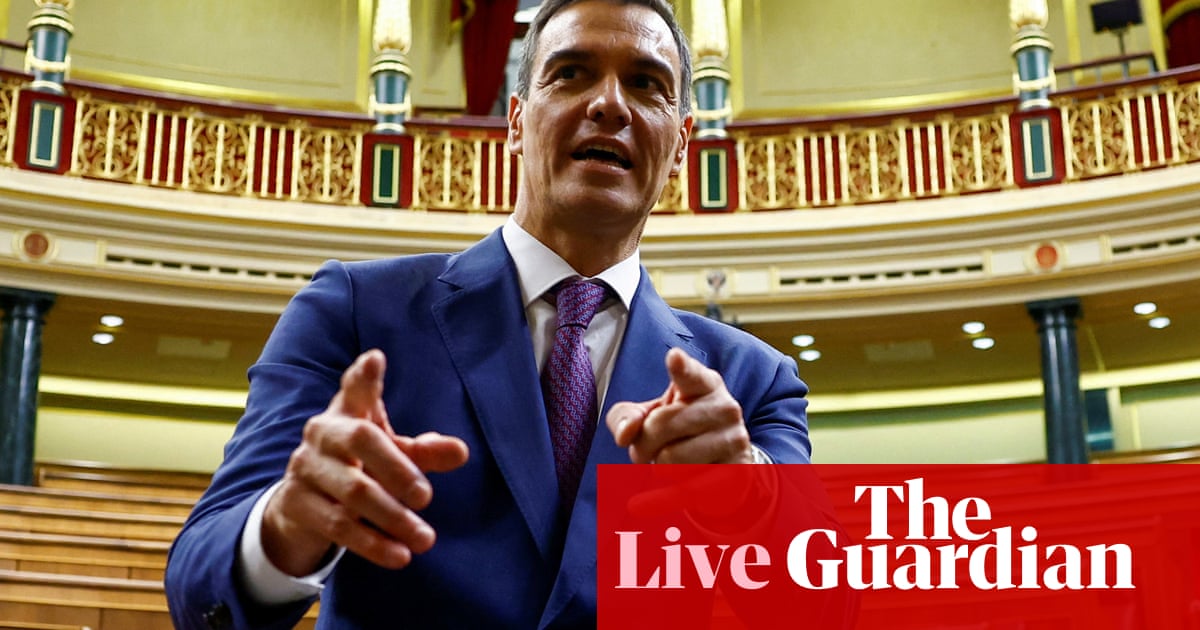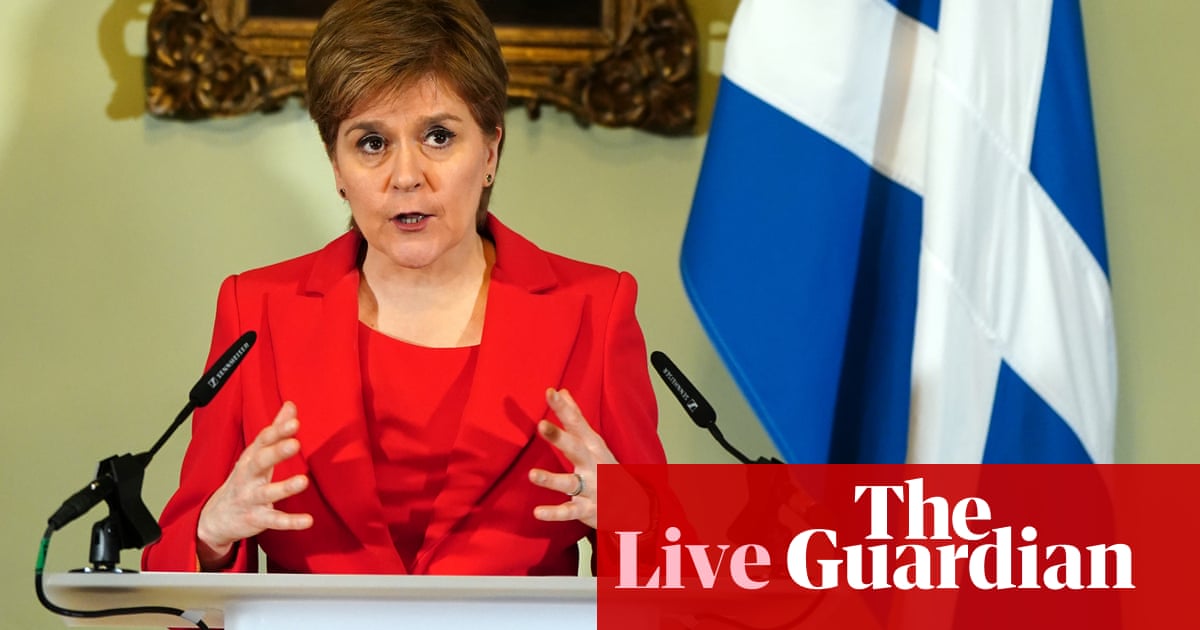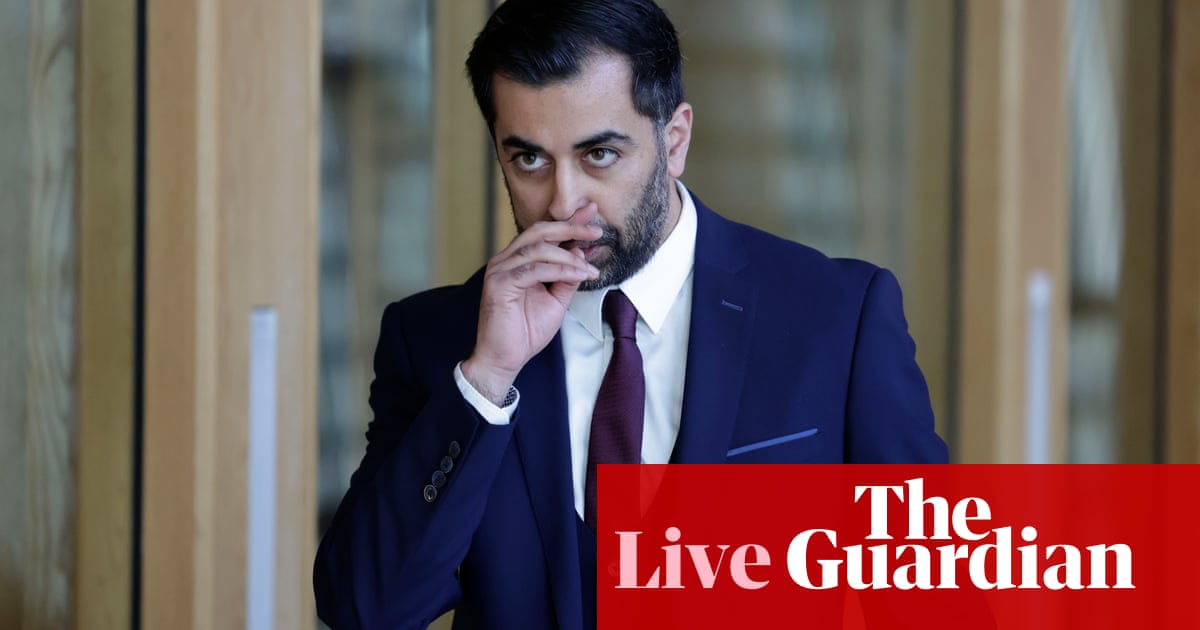
Russell Findlay MSP wins Scottish Conservative leadership election
Severin Carrell is the Guardian’s Scotland editor
Russell Findlay, a former crime reporter, has been appointed as the next leader of the Scottish Conservatives after the most fractious period in the party’s history.
Findlay, a relative newcomer to the Scottish parliament, beat the party veteran Murdo Fraser and its former deputy leader Meghan Gallacher after a short contest triggered by the resignation of Douglas Ross.
The clear favourite to win after a well-organised and extensive campaign, Findlay had been endorsed by Ruth Davidson, the Scottish party’s most successful recent leader, and a host of Holyrood backbenchers.
Ross stood down as leader after a rebellion by MSPs and activists over his decision to replace a widely liked candidate who was recovering from a medical operation, David Duguid, as the general election candidate for Aberdeenshire North and Moray East.
After the backlash, Ross became the only Scottish Tory to lose a Westminster seat that the party was defending after a surge in support for Reform UK. Reform won 5,562 votes, well above Ross’s margin of defeat by 942 votes to the Scottish National party candidate.
The leadership contest was marred by infighting, accusations of dirty tricks and angry disputes involving Gallacher and John Lamont, the Tory MP who serves as shadow Scotland secretary.
Those rows included the resumption of an old feud between Davidson and Fraser over Fraser’s proposals for a breakaway Scottish party dating to 2011, when they both stood for the leadership. Davidson accused Fraser of plotting to resurrect that proposal by stealth if he had won the leadership, a charge he denied.
Summary of the day …
Rachel Reeves is rethinking parts of Labour’s crackdown on non-dom tax status over concerns that the plans will not raise any money. The chancellor is reassessing the government’s manifesto promise to close loopholes in the non-domiciled tax regime
Russell Findlay, the newly elected leader of the Scottish Conservatives, has said his party faces a significant threat from Reform UK in Scotland. Of the 4,155 Scottish Tory members who voted, 2,565 backed Findlay in the first round, with 1,187 votes going to his closest rival, Murdo Fraser
Polling by Savanta suggests that a third of Conservative voters in the 2024 general election believe the party lost because it wasn’t right-wing enough
Systemic failures in the way police deal with stalkers are leaving victims at “serious risk” with some given wrong and “potentially dangerous” advice, a damning report by police chiefs in England and Wales has found
A man who was the first person in the UK to be convicted of a charge of riot after widespread disorder this summer has been jailed for four years and four months
Two Just Stop Oil activists have been jailed for throwing tomato soup over Van Gogh’s Sunflowers
Thank you for reading and all your comments. Andrew Sparrow will be back on Monday, and I will see you here again sometime soon.
We reported earlier that DWP figures released today show the government received about 74,400 pension credit claims in the eight weeks since 29 July, when chancellor Rachel Reeves announced the winter fuel payment would be means-tested.
PA Media is now carrying a government spokesperson statement about the figures:
We are committed to supporting pensioners, with millions set to see their state pension rise by £1,700 this parliament through our commitment to the triple lock.
Given the dire state of the public finances we have inherited, it’s right we target support to those who need it most.
Over a million pensioners will still receive the winter fuel payment, and our drive to boost pension credit take-up has already seen a 152% increase in claims.
Many others will also benefit from the £150 warm home discount to help with energy bills over winter while our extension of the household support fund will help with the cost of food, heating and bills.
Severin Carrell, the Guardian’s Scotland editor, has this analysis of the challenge facing the newly elected leader of the Scottish Conservatives
Through an accident of timing, Russell Findlay will have his first outing as Scottish Conservative leader on Sunday when he addresses the UK party’s annual conference in Birmingham, in the heat and glare of the national lens.
Given his tentative performance after being confirmed as Douglas Ross’s successor earlier on Friday, it is likely to be workmanlike. But in it he needs to flesh out how he thinks the Scottish Tories can recover from their dire general election, when they won their lowest vote share in decades.
The election produced two contradictory messages for the Scottish Tories: despite the UK party’s humiliation in England, the Scottish party held five of their six Westminster seats. But they did so with just 12.7% of the national vote, nearly half that for the Tories UK-wide.
They were caught in a pincer movement from a resurgent Labour party, which recaptured Scotland’s centrist unionist voters, and the upstarts at Reform UK. Not only did a surge in support for Reform lead to defeat for Ross in Aberdeenshire North and Moray East, it also won a Scotland-wide 7% share.
If that is repeated at the next Scottish parliament election in May 2026, Reform could well win seats at Holyrood, almost certainly at the Scottish Tories’ expense.
An already crowded political landscape at Holyrood, where six parties hold seats, will become more complex yet.
Findlay faces a significant challenge: does he try to replicate Ross’s strategy of focusing hard on heartland issues such as championing North Sea and combating Scottish independence, or Ruth Davidson’s much more successful recasting of the Tories as centrist one nation unionists.
Ross’s strategy arguably worked: the Tories saved nearly every Westminster seat (apart from his) by focusing narrowly on tribal Tory interests. But if the Scottish Tories remain at 12-13% in 2026, and with a well-funded Reform party nipping at its heels, it faces humiliation under Holyrood’s proportional voting system.
For most non-nationalist voters, a second independence referendum is no longer a signficant concern. Fighting for oil jobs has little appeal outside the north-east, unless Findlay chooses to champion opposition to new windfarms in rural areas.
What may help save him is Reform’s failure to replicate its UK election success in a Holyrood contest: it has no known Scottish leader and must build up a campaign apparatus from nothing. The Scottish general election contest was heavily framed by UK issues. Thankfully for Findlay, Nigel Farage will not be on the Holyrood ballot paper.
Savanta has some polling today which suggests that whoever ends up as the leader of the opposition, they will face a tough time pulling back together the coalition of Conservative voters that propelled the party to successive election victories over the last 14 years.
With most of the leadership hopefuls tacking to the right to try to recapture votes lost to Reform UK, the polling found that a quarter of Conservative voters in 2024 felt the party lost the election in the summer because it wasn’t moderate enough, but a third of Conservative voters in 2024 pin the defeat on the party not being right-wing enough.
My colleagues Fiona Harvey and Helena Horton report that climate and the environment have hardly featured during the lengthy Conservative leadership contest, but that the party will soon have to work out where it is going to position itself on those issues for the coming few years of being in opposition …
Russell Findlay, the newly appointed Conservative leader in Scotland has said on social media “It’s an absolute privilege to be elected.”
He said “The hard work starts now,” adding “Under my leadership, we are going to change. We’ll represent everyone who wants some common sense for a change.”
My colleague Alexandra Topping reports that a damning report by police chiefs in England and Wales has found systemic failures in the way police deal with stalkers that are leaving victims at “serious risk”, with some given wrong and “potentially dangerous” advice.
Readers (and live bloggers) of a certain age may recall Martin Bell being elected as an MP in 1997 when he stood as a protest candidate against Neil Hamilton, a man the Guardian famously called a liar and a cheat on a front page in 1996 and who once danced on television while Johnny Vegas threw fish at him. Hamilton is currently honorary president of Ukip.
Bell has written for the Guardian today, arguing “It’s not just the money, it’s the sense of entitlement. That’s the cause of sleaze in UK politics”
Severin Carrell is the Guardian’s Scotland editor
Murdo Fraser, the veteran Scottish Conservative MSP who came second in the party’s leadership contest, has said it could be necessary for the Scottish party to openly disagree with the next UK Tory leader, to maintain its distinct policy agenda.
Fraser was soundly beaten in the contest on Friday morning by his rival Russell Findlay, a relatively inexperienced MSP and former crime reporter who won with 61.7% of the votes in the first round.
Asked whether he believed the Scottish party needed to be outspoken in protecting its centre-right positioning if the new UK leader pulled the party to the right, Fraser said:
I think there is a delicate balancing act here, because you don’t want to be continually at war with your colleagues south of the border.
And I think there are a lot of issues that can be resolved privately behind the scenes, which is far better, but there may be instances where it’s necessary for the Scottish leader to disagree publicly with the UK leader as indeed, as was referred to earlier, Ruth [Davidson] was prepared to do when she was leader. But you know, I think these should be exceptions rather than the rule.
Many pundits believe the Scottish Tories revival under Davidson was in part due to her often outspoken disagreements with UK Conservative leaders. She sought to construct a distinctively one nation centre-right policy agenda in Scotland, backing gender reforms, immigration and the European Union.
Speaking to reporters after his victory was confirmed, Findlay said he would prefer to keep policy disagreements with the new UK leader confidential. He said the fact the party was in opposition made that task easier.
Whoever prevails [in the UK leadership contest] will need to work closely and respectfully with the Scottish leader and inevitably it’s healthy that there will be disagreements. If that’s done privately and respectfully, that’s a perfectly reasonable thing to do.
Of course the dynamic is somewhat different because the Conservatives are no longer the government, so we do perhaps have that breathing space to have those more frank discussions without the pressure of day to day government.
Political correspondent Eleni Courea reports
Rachel Reeves is rethinking parts of Labour’s crackdown on non-dom tax status over concerns that the plans will not raise any money.
The chancellor is reassessing the government’s manifesto promise to close loopholes in the non-domiciled tax regime.
The Guardian revealed this week that Treasury officials feared the spending watchdog was due to conclude the policy would fail to raise any money, because of the impact of super-rich non-domiciles leaving the UK.
Reeves is now reconsidering the plans, according to multiple reports. A government official told the Financial Times: “We are looking at the details of our proposals. We will be pragmatic, not ideological. We won’t press on regardless, but we are not going to abandon this completely.”
After the Conservatives unexpectedly announced plans to phase out the non-dom regime, Labour said they hoped to raise a further £2.6bn over the course of a parliament by clamping down on loopholes.
The party later predicted that closing these loopholes could raise an initial £1bn in the first year, which would be put towards funding universal school breakfast clubs and more hospital and dental appointments.
However, there are concerns inside the Treasury that the Office for Budget Responsibility (OBR) may now conclude the plans will raise no money at all and could prompt wealthy foreigners to leave the UK.
Andy Haldane, a former chief economist at the Bank of England, said earlier this week that there should be “cause for pause” on the government’s plan.
The OBR originally forecast that scrapping the tax break for wealthy foreigners could raise about £3.2bn a year – though this was deemed to be “highly uncertain” as wealthy people could either leave Britain or find ways to avoid the tightening of tax rules.












